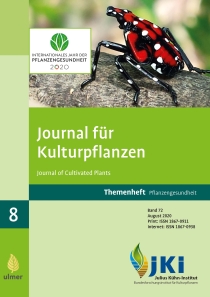The Japanese beetle (<em>Popillia japonica</em>) – a pest with major phytosanitary risk potential for Germany and Europe
DOI:
https://doi.org/10.5073/JfK.2020.08.15Keywords:
plant health, Japanese beetle, Popillia japonica, morphology, lifecycle, phytosanitary risk, quarantine pestAbstract
The timely recognition of the high damage potential of a plant pest and the prevention of its introduction or spread is a central concern of plant health. For this reason, special regulations and measures apply to the Japanese beetle (Popillia japonica) as a union quarantine pest. The polyphagous beetle usually develops within one year and causes severe economic damage in non-endemic areas. A determination of the beetles is possible up to the species. First findings of Japanese beetles in Germany have not been confirmed.
Downloads
Published
Issue
Section
License
The content of the journal is licensed under the Creative Commons Attribution 4.0 License. Any user is free to share and adapt (remix, transform, build upon) the content as long as the original publication is attributed (authors, title, year, journal, issue, pages).
The copyright of the published work remains with the authors. The authors grant the Journal of Cultivated Plants, the Julius Kühn-Institut and the OpenAgrar repository the non-exclusive right to distribute and exploit the work.







